Reflections on our sustainable future from Thinkers50
Fujitsu / December 18, 2023
November 2023 saw the return of the biennial Thinkers50 Awards Gala in London: the first time this inspirational group of top leadership and management thinkers have gathered in person since the pandemic.
Thinkers50 is a unique opportunity to share concepts and ideas that will shape the future of business and society. Incorporating these insights into Fujitsu’s strategy is a powerful way to accelerate our own journey to becoming a net positive organization.
My key lessons from the event were around innovation, trust, and humanity.
Achieving transformational innovation in an uncertain era
“Make the world more sustainable by building trust in society through innovation.”
This is Fujitsu’s purpose. As a technology company, we put innovation at the heart of what we do. Innovation has long been a mainstay of management thinking. Facing many challenges to our planet, economic growth, and wellbeing, innovation is more crucial than ever before.
Yet delivering on the promise of innovation remains a frustratingly stubborn challenge. Why is this? And how can leaders change their approach to innovation?
One important step is to create both a framework and an environment to nurture innovation, according to Sheena Iyengar (Thinkers50 Innovation Award winner) and Amy Edmonson.
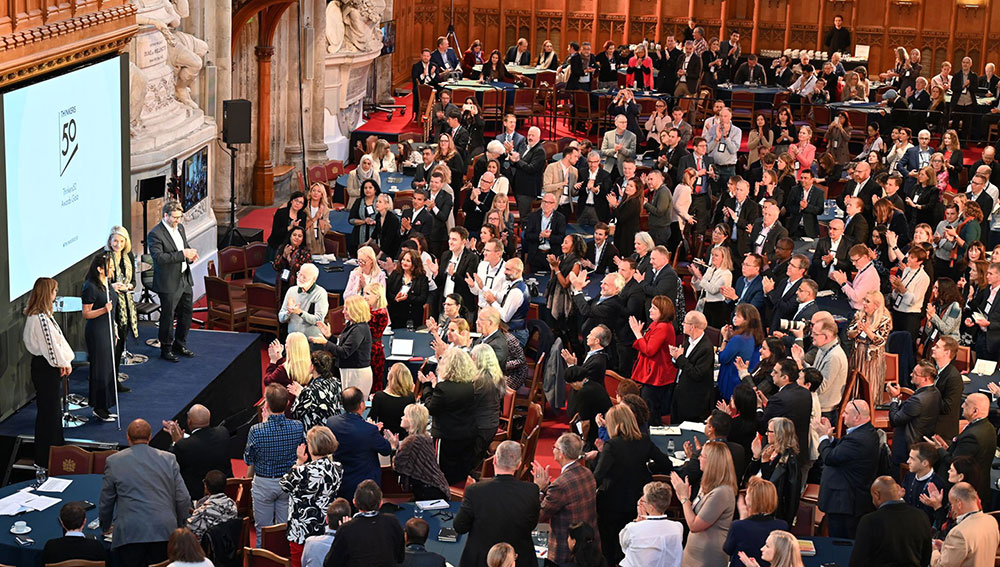
Participants at Thinkers50 stand to applaud Sheena Iyengar and Amy Edmonson.
Iyengar’s work challenges many common practices, such as brainstorming. Instead, she recommends a focused six-step approach that innovates the process of innovation itself to generate better ideas.
Alongside this, everyone in an organization must feel safe to innovate. Edmonson explained the importance of psychological safety and encouraging “intelligent failure” – where even if a project fails, value is gained.
Another critical element of innovation is how deep it goes. It’s relatively easy to innovate at a superficial level; for example, to improve efficiency within a business process. But it can be much harder to innovate holistically – is that the right business process? Is it even needed at all?
In their discussion, Megan Reitz and Jim Detert explored the necessity for leaders to listen up, and to challenge the “deep rules” of their organizations. Most leaders revert to habits in the face of uncertainty – but existing habits may not serve you well in dealing with wicked problems.
Instead, leaders must be bolder, listen to a diversity of viewpoints, and check their blind spots. As Detert observed, power is not just the ability to decide, but the ability to decide even what is discussed. This power should be used wisely.
Building on this theme, Amy Webb highlighted how leaders are often driven by “fear, or fear of missing out” that can lead to stagnation and paralysis. As the pace of change accelerates, this stance can be an existential threat.
To overcome this inertia, Webb recommended taking a data-driven, future-looking approach. Many leaders use historical data; some use current data; far fewer truly invest in analytics to forecast and identify leading signals. This will become a powerful differentiator for future success.
Emphasizing our commitment to innovation, Fujitsu was proud to sponsor the Thinkers50 Innovation Award. It was truly inspiring to see the great work from all the nominees. The award was presented by Fujitsu SVP Ichiro Aoyagi, who commented:
“Sustainability always talks about problems. But I’m convinced, over the past two days, that with the wisdom and knowledge of everyone here, we can overcome these challenges. I am proud that Fujitsu has sponsored this innovation award for the past 10 years.”
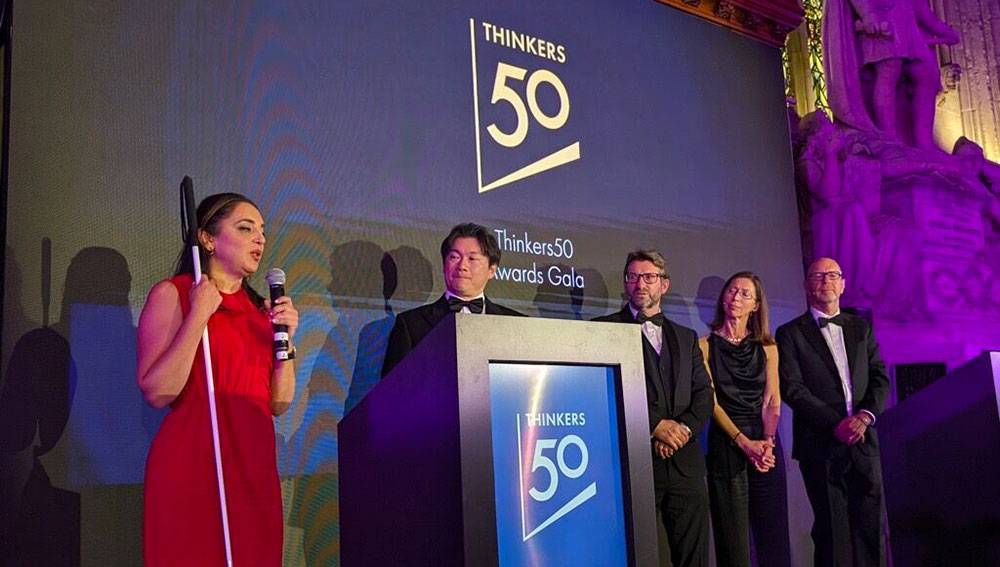
Sheena Iyengar (left) speaks on stage having received the Thinkers50 Innovation Award, presented by Fujitsu’s Ichiro Aoyagi (second left).
Everything we heard at Thinkers50 emphasized that success for all organizations depends on innovation. No leader can afford to ignore it.
Rebuilding trust to build a sustainable future
All that we heard about innovation left no doubt of the imperative to change.
Yet change depends on trust. Whether for employees, customers, or citizens, if trust breaks down, so does transformation.
Trust faces severe challenges. Trust in institutions is low. There is widespread public mistrust in businesses. And developments in technology put even more strain on our collective trust.
Within any organization, transformation depends on trust between management and employees. This can be massively impacted by the organization’s approach to Diversity, Equity, and Inclusion (DEI).
In a panel discussion with Ruchika Tulshyan, Modupe Akinola, and Rukasana Bhaijee, the Thinkers50 attendees were challenged to address our own biases and adopt a transformational approach to DEI.
It is often uncomfortable to face up to the reality of discrimination – particularly in yourself. Leaders must accept this discomfort and engage honestly to drive real progress.
It’s now well known that diversity of thought and experience drives better outcomes, yet many organizations still do not empower all employees to be themselves.
If leaders engage authentically and explain why they care about DEI, this will build greater trust and lay the groundwork for sustainable performance.
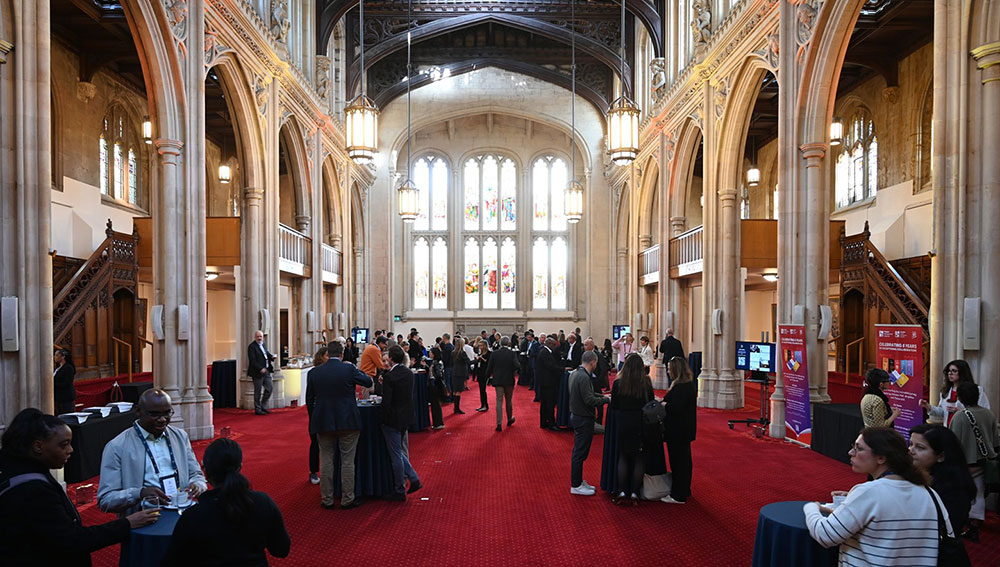
Thinkers50 participants in conversation during a coffee break at the event.
Another element of trust is in the technology that is increasingly central to how we work, travel, shop, bank, communicate, look after our health, and more. Without trust in this technology, humanity has a big problem.
During a provocative conversation, Sinan Aral commented on why humans find it hard to conceptualize technology change: it progresses exponentially, whilst humans think linearly.
Martin Lindstrom went on to highlight the importance of using the technology itself to forecast how it could develop in future, and to create guardrails to minimize both current and future harms.
Aral also shared a disturbing speculation that the rise of AI-generated material, algorithm-driven social media, and increasing division could mean the end of a shared reality. This shared understanding of truth is critical to human progress: we cannot afford to lose it.
This discussion was a stark warning of the importance of trust – not only in the technology of today, but in directing how it develops in future. Both business leaders and technologists have a responsibility to ensure technology can be trusted.
Trust is central to Fujitsu's R&D and in our work with customers. It's important not only that all stakeholders can trust the technology itself, but also that it is used to create greater trust within society.
For example, we have worked with AB InBev to create transparency and trust throughout the barley supply chain.
Humanity is everything
The language of business is often impersonal. Decisions are based on facts and figures. We spend much of our working life interacting through screens.
Yet no organization exists independently of its people: employees, customers, citizens. Without making a real difference to human beings, any organization is falling short of its potential.
To succeed, leaders must put human experience first.
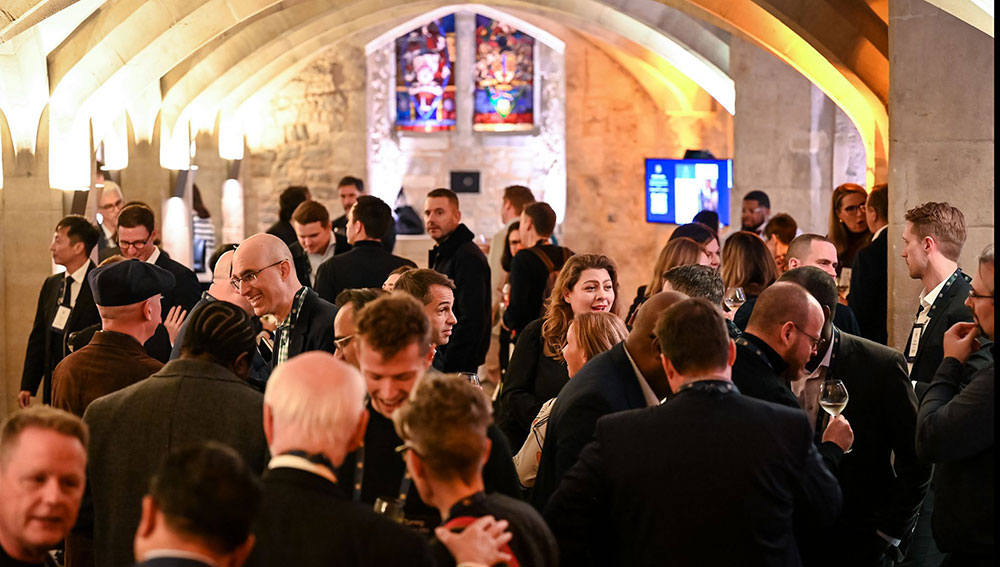
Thinkers50 participants in discussion between sessions at the event.
Again, this is particularly true for how leaders engage their own teams, as we heard in a discussion with Sanyin Siang, Kirstin Ferguson, and Alyson Meister. Today’s climate is uniquely disruptive. Leaders who can share their own truths, demonstrate authenticity, and build human connection will empower a collective effort to thrive in difficult times.
Leaders also must prioritise the human element when making decisions about technology. Kate O’Neill highlighted this during her panel discussion, where she emphasised the importance of human connection. She went on to recommend that leaders look at where AI and technology can accelerate alignment amongst all stakeholders – enhancing human connection rather than replacing it.
Putting technology in service of humanity is core to Fujitsu’s approach, whether leveraging AI and quantum computing to accelerate drug discovery in healthcare, to improving employee experience through innovative use of workplace solutions.
Nurture innovation, build trust, and focus on people first to succeed
Thinkers50 left me in no doubt of the importance of good ideas, and the continued role that management thinking has to inspire a better future for us all.
To succeed through the challenges all organizations face, leaders must focus on innovation, trust, and humanity. Those that do will reap the benefits.
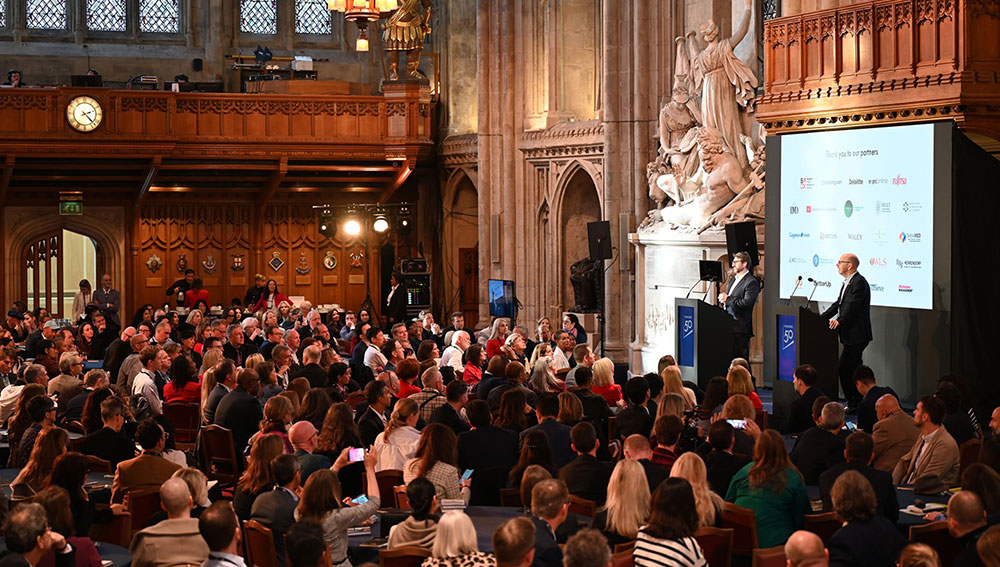
Thinkers50 founders Des Dearlove and Stuart Crainer speak on stage at the event.
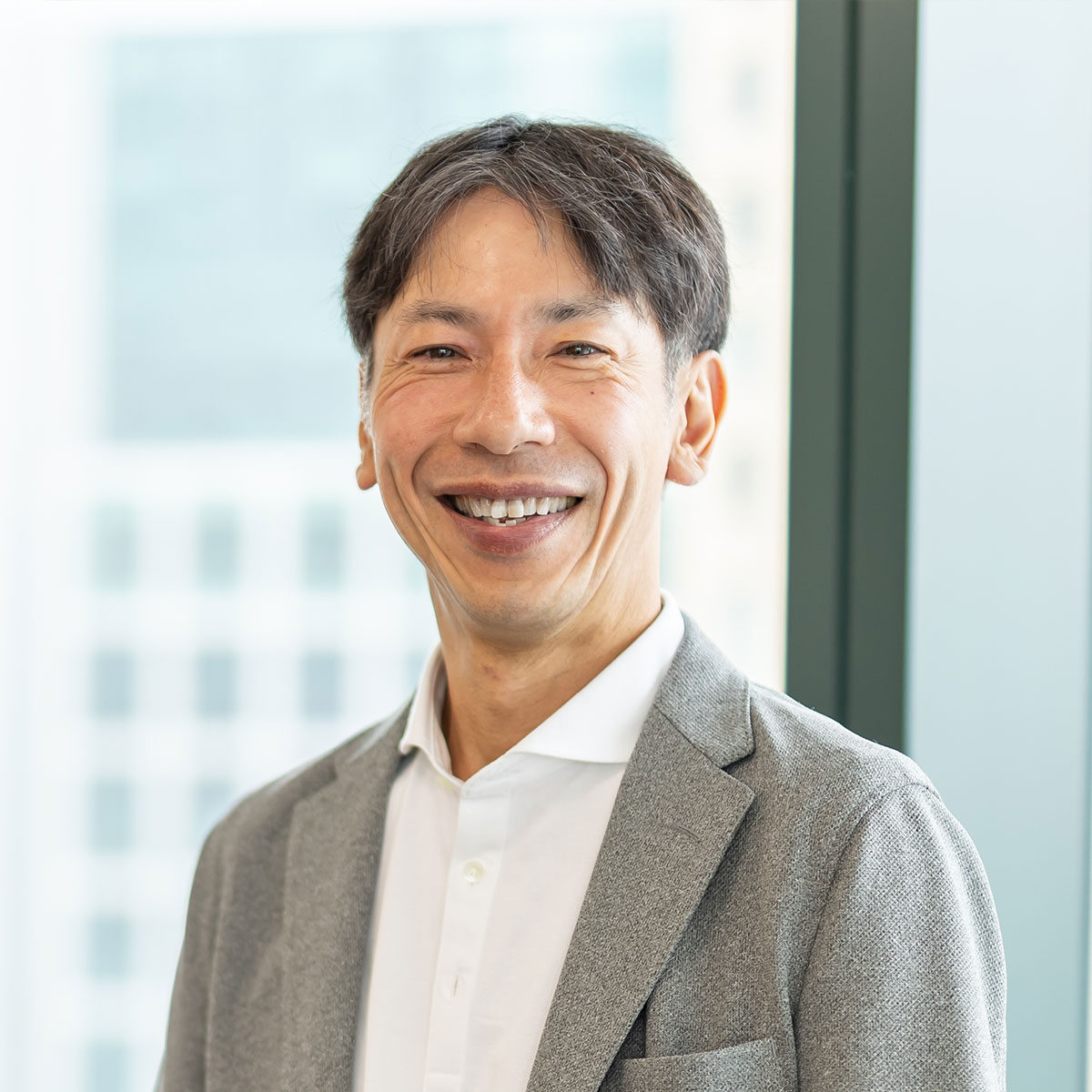
Related information
Editor's Picks




